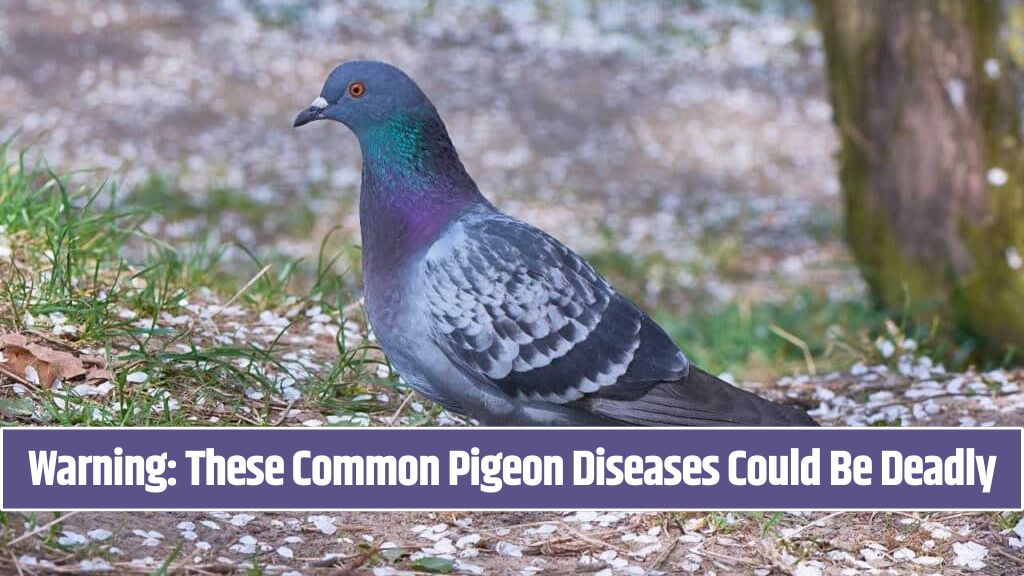Pigeons are popular pets, known for their intelligence and adaptability. However, like all birds, they are susceptible to various diseases that can impact their health. Some illnesses cause mild symptoms, while others can be life-threatening if not treated.
Common pigeon diseases include respiratory infections, parasitic infestations, and digestive tract issues. Understanding these conditions can help pigeon owners provide proper care and treatment.
1. Canker (Trichomoniasis)
Canker is a common pigeon disease caused by a protozoan parasite. It mainly affects the digestive and respiratory tracts.
Symptoms:
- Difficulty breathing
- Visible nodules in the throat
- Diarrhea
- Weight loss
- Lethargy
- Bleeding from the mouth or cloaca
Causes & Transmission:
Canker spreads when pigeons share water bowls, engage in billing (beak-touching behavior), or feed their young with crop milk. The parasite cannot survive long outside a bird’s body, reducing the risk of contamination in the environment.
Treatment:
- Medications prescribed by a vet
- In severe cases, surgical removal of nodules
2. Intestinal Worms
Pigeons can be infected by various worms, including roundworms, tapeworms, and hairworms.
Symptoms:
- Diarrhea
- Weakness
- Increased risk of other infections
- Poor performance in racing pigeons
Causes & Transmission:
Pigeons get worms by ingesting infected droppings or consuming insects carrying the parasite.
Treatment & Prevention:
- Routine fecal examinations
- Deworming medication, either in water or administered orally
3. Coccidiosis
Coccidia is another intestinal parasite that affects pigeons and other birds.
Symptoms:
- Diarrhea
- Malabsorption of nutrients
- Weight loss
- Weakness and lethargy
Causes & Transmission:
Pigeons contract coccidia by consuming contaminated droppings. The parasite is commonly present in pigeon lofts, but a small amount is generally not harmful.
Treatment:
- If the pigeon appears healthy, treatment may not be necessary
- If symptoms appear, medication is required to reduce the parasite load
4. Hexamitiasis
This condition is caused by a protozoan similar to the one responsible for canker but is generally less severe.
Symptoms:
- Vomiting
- Weight loss
- Bloody diarrhea
Causes & Transmission:
Hexamita lives in the digestive tract and can be detected through a microscopic fecal examination.
Treatment:
- Medication to eliminate the parasite
- Maintaining good hygiene in the pigeon’s living area
5. External Parasites (Lice, Mites, and Flies)
External parasites can cause discomfort and lead to serious health issues in pigeons.
Symptoms:
- Scaly patches on unfeathered areas
- Tiny holes in feathers
- Constant itching and irritation
Causes & Transmission:
Parasites spread from bird to bird or from contaminated environments.
Treatment:
- Medicated sprays or powders
- Regular cleaning of cages and lofts
6. Respiratory Infections
Respiratory infections are among the most concerning health issues in pigeons. They can be caused by fungi, bacteria, viruses, or mites.
Symptoms:
- Open-mouth breathing
- Labored breathing
- Fluffed-up feathers
- Reduced activity
- Nasal discharge
- Coughing or sneezing
Causes & Transmission:
- Exposure to infected birds
- Poor air quality in lofts
- Stress, which weakens the immune system
Treatment:
- Veterinary diagnosis to determine the cause
- Proper medication (antibiotics, antifungals, or antiparasitics)
- Cleaning and disinfecting the environment
7. Chlamydia in Pigeons
Pigeons can carry different strains of chlamydia, which may cause respiratory infections. Some birds show no symptoms, but stress can trigger flare-ups.
Symptoms:
- Respiratory distress
- Watery eyes and nasal discharge
- Lethargy
Treatment & Management:
- Symptomatic treatment
- Medications to control symptoms, but no permanent cure
- Maintaining a stress-free environment
8. Mycoplasma Infection
Mycoplasma is another bacterial infection that affects the respiratory system.
Symptoms:
- Sneezing and coughing
- Nasal discharge
- Breathing difficulties
Causes & Transmission:
Stress is a major factor that makes pigeons susceptible to mycoplasma infections.
Treatment:
- Antibiotics prescribed by a vet
- Reducing environmental stress
Pigeons, like all pets, require proper healthcare and regular checkups. Most common pigeon diseases can be prevented through good hygiene, proper nutrition, and reducing stress. Regular veterinary examinations, timely treatments, and maintaining a clean living space are key to keeping your pigeon healthy and happy. If your pigeon shows signs of illness, consult a vet immediately to ensure early diagnosis and treatment.

